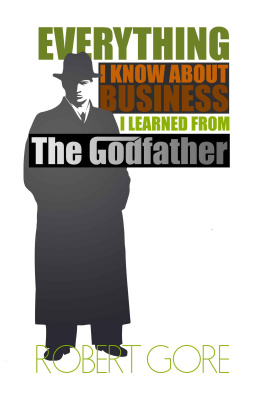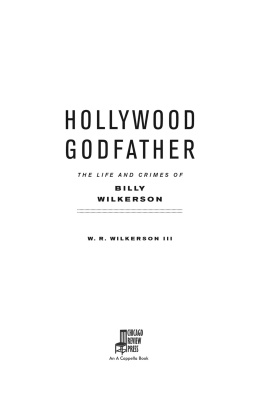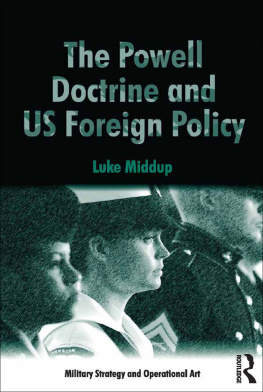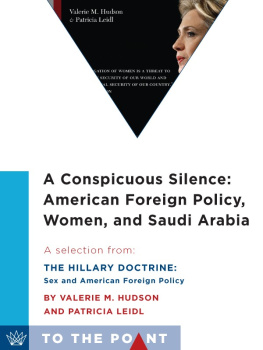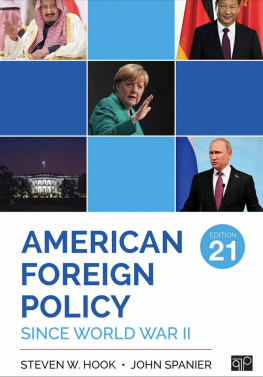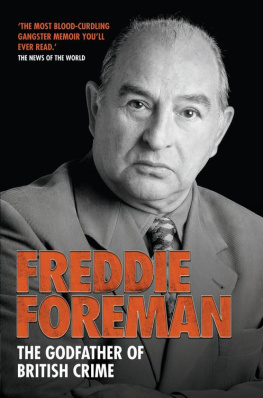John C. Hulsman and A. Wess Mitchell
The Godfather Doctrine
A FOREIGN POLICY PARABLE
PRINCETON UNIVERSITY PRESS
PRINCETON AND OXFORD
Copyright 2009 by Princeton University Press
Published by Princeton University Press, 41 William Street, Princeton, New Jersey 08540
In the United Kingdom: Princeton University Press, 6 Oxford Street, Woodstock, Oxfordshire OX20 1TW
All Rights Reserved
Library of Congress Cataloging-in-Publication Data
Hulsman, John C., 1967
The Godfather doctrine : a foreign policy parable / John C. Hulsman and A. Wess Mitchell.
p. cm.
ISBN 978-0-691-14147-3 (hardcover : alk. paper) 1. United StatesForeign relations1989 2. Godfather filmsHistory and criticism. I. Mitchell, A. Wess, 1977 II. Title.
JZ1480.H85 2009
327.73dc22
2008042881
British Library Cataloging-in-Publication Data is available
This book has been composed in Minion Pro
Printed on acid-free paper.
press.princeton.edu
Printed in the United States of America
10 9 8 7 6 5 4 3 2 1
To Eva and Elizabeth,
the ultimate wartime consiglieres
Contents

The Don, rest in peace, was slippin.
Ten years ago could I have gotten to him?
Virgil the Turk Sollozzo
Introduction

The age of American global dominance is drawing to a rapid and definitive close. In the space of barely a decade, the United States has slipped from a position of seemingly inexhaustible national strength to one of breathtaking vulnerability. Crowning its victory in the Cold War, the American Republic sat atop an economic, diplomatic and military power base rivaling that of the Roman Empire. American businesses set the pace of global commerce; American diplomats piloted international institutions whose rules we ourselves had written; and American armies were underwriters of peace in the worlds remotest regions. Americas was a power so irresistible, and an influence so pervasive, that no country, large or small, could reasonably hope to succeed in an international undertaking without Washingtons blessing.
That world is gone. America in 2009 is economically palsied, diplomatically isolated, and militarily exhausted. Rather than a triumphant stroll along the flagstone-paved pathway to a new American Century, the countrys current course looks more and more like a grim and unforgiving trudge down the steep and rocky slope of decline. Upon assuming office, the forty-fourth president will inherit two simultaneous land wars, a rapidly arming Iran, a brooding and reanimated international jihad, a tottering atomic Pakistan, a $500 billion budget deficit, a devastating mortgage and investment banking crisis, a $700 billion bailout of the financial sector, and the weakest dollar in modern American history. He will also be the first U.S. president since the end of the Cold War to face a world in which America must share its seat in the global cockpit with other Great Powers. A resurgent and energy-rich Russia, a geopolitically awakened India, and a booming and proud Chinaall see themselves as rising powers gaining traction at the expense of the United States. They will expect to have a say in how the world is run.
Just as the challenges facing the United States are growing more numerous, the tools for managing them will be scarcer than ever. With a national image still deeply disfigured around the world by the Iraq War and a Western alliance system on the verge of rupture, the next president could well find himself commander-in-chief of the loneliest nation on earth.
This is not the America that emerged victorious from the life-or-death struggle of the Cold War. Chastened and confused, America must find the courage, resources, and, above all, creativity to navigate a world unlike anything that U.S. statesmen in living memory have had to confront. For we live in a world none of us studied in school. It will neither be wholly dominated by one great empire nor be the chessboard on which many countries with roughly equal power vie to establish their dominance. We are entering new geopolitical territory. For a long time, the United States will remain chairman of the global board of directors. But it is not enough merely to look to America anymore. The confusing thing will be that there are new and rapidly growing board members, and that the boards membership will vary depending on the issue. Brazil will be new to the board, as will China. Gone is the comforting simplicity of the old Cold War era, with one enemy to fight, one ideology to defeat, one opposing system to understand. Ours is a strange and complicated new world.
To survive and prosper in this radically transformed age, Americas leaders, we believe, must adopt a radically new strategyone that is fundamentally different, in its core assumptions and preferred instruments, from the alternatives currently posed by either of the nations two major political parties. Like most Americans, we believe that the neoconservative approach to foreign policy that has held sway in Washington for the past eight years has been disastrous and must be discarded. But we also believe that the intellectual alternative put forward by the Democratic Partyliberal institutionalismwill also leave the nation ill-prepared for the epochal change that lies ahead.
Instead, we believe that, in a time of unprecedented crisis, the United States must employ the least ideological and most thoroughly tested approach to foreign policy at its disposala school of thought known as realism. At its root, realism can be reduced to a simple proposition: that, in order to anticipate and adapt to change in international politics, you must first understand the nature, uses, and limitations of power, tailoring strategies to the actual capabilities a country possesses. In this, it differs from its intellectual competitors, both of whichdespite their seeming partisan animosityshare a preoccupation with how other states are governed on the inside. If only foreign governments could be broughtthrough force of arms or force of diplomacyto resemble our own, so the reasoning goes, America could finally and definitively inoculate itself, and the rest of the world, against the old contagions of war, crisis, and geopolitical competition. History could then come to an end as the rest of the globe would look like America, sharing both its values and its interests.
This is a laudable dream, as dreams go. But it is well beyond the current power of the United States, or indeed any power in recorded history, to accomplish. The pursuit of such an unrealistic dream will soon morph into the unending nightmare of national decline as the rest of the world, not convinced that it should give up its ambitions to follow an arrogant America, fights back militarily, economically, and diplomatically. Saying that we mean well is unlikely to convince the rest of the world to forsake its own dreams, values, and interests.
Such a gargantuan undertaking would have been beyond America even during its heyday following 1945. In the new multipolar era, it should be comical to think the United States need merely dictate, and others will follow. But such a view is still all too popular in both parties. This is because both neoconservatism and liberal institutionalismmuch as their adherents often personally dislike one anothershare an understandable vice, that of nostalgia for a world that has passed them by. It is entirely human to want to continue to live in the simple Cold War world, where America was dominant, its choices clear, its strategy set. As a result, America increasingly finds itself with a unipolar mind-set and a bipolar toolbox in a multipolar world. When this dangerous affection for a past that cannot be re-created in todays changed world is linked with universalist policy goals that no great power could ever hope to enact, the end result is a great acceleration in Americas decline. For realists are surely right that, to make the world better, we must see it as it is, warts and all, rather than as we would like it to be.
Next page



